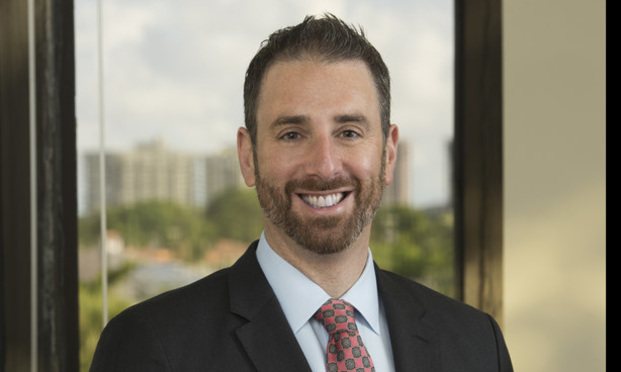Midsize and Small Law Firms Skip the Lockstep Pay Dance
While Am Law 200 firms sway to the annual associate pay dance, midsize and small law firms are happy to be wallflowers.A lockstep salary scale…
June 19, 2018 at 12:06 PM
2 minute read
 On hiring and pay decisions, Jeff Schneider, managing partner of the 16-attorney litigation firm Levine Kellogg Lehman Schneider + Grossman in Miami, said, “We have a small group of equity partners, so pretty much we do everything by consensus.” The partners meet every couple of months, go a round the table and assess staffing needs. “If at the end of the process people are screaming that they're too busy, we'll hire,” Jeff Schneider said. “If you go two or three months and people are too busy, it's unhealthy, and that's when we know we need another lawyer.” “They'll say to their friends. 'I'm happy, you're not,' " and lay the groundwork for a move, Jeff Schneider said. Usually, the two attorneys — inside and out — went to law school together or worked together at another firm. “They're not just colleagues; they're friends. And that's exactly what we have at the top." to address non-attorney staffing needs. “We didn't used to be statewide. Now we're multistate” with offices in New York, New Jersey and Pennsylvania. “We've got a bigger platform now,” and more hiring is under way. Pay issues for attorneys run through three committees: a hiring committee for new hires, compensation committee for annual reviews and a bonus committee for annual bumps. The committees “probably do 90 percent of the lifting, 95 percent of the lifting,” Hendricks said. When bigger firms recruit Lydecker attorneys, Hendricks said he'll bow out gracefully. A recent departee was offered $40,000 a year more to go, and “I shook his hand.” But some end up returning. While starting pay may be lower than Big Law, “We catch up to them, and we might even pass them after a few years.”
On hiring and pay decisions, Jeff Schneider, managing partner of the 16-attorney litigation firm Levine Kellogg Lehman Schneider + Grossman in Miami, said, “We have a small group of equity partners, so pretty much we do everything by consensus.” The partners meet every couple of months, go a round the table and assess staffing needs. “If at the end of the process people are screaming that they're too busy, we'll hire,” Jeff Schneider said. “If you go two or three months and people are too busy, it's unhealthy, and that's when we know we need another lawyer.” “They'll say to their friends. 'I'm happy, you're not,' " and lay the groundwork for a move, Jeff Schneider said. Usually, the two attorneys — inside and out — went to law school together or worked together at another firm. “They're not just colleagues; they're friends. And that's exactly what we have at the top." to address non-attorney staffing needs. “We didn't used to be statewide. Now we're multistate” with offices in New York, New Jersey and Pennsylvania. “We've got a bigger platform now,” and more hiring is under way. Pay issues for attorneys run through three committees: a hiring committee for new hires, compensation committee for annual reviews and a bonus committee for annual bumps. The committees “probably do 90 percent of the lifting, 95 percent of the lifting,” Hendricks said. When bigger firms recruit Lydecker attorneys, Hendricks said he'll bow out gracefully. A recent departee was offered $40,000 a year more to go, and “I shook his hand.” But some end up returning. While starting pay may be lower than Big Law, “We catch up to them, and we might even pass them after a few years.” REDIRECTING TASKS
This content has been archived. It is available through our partners, LexisNexis® and Bloomberg Law.
To view this content, please continue to their sites.
Not a Lexis Subscriber?
Subscribe Now
Not a Bloomberg Law Subscriber?
Subscribe Now
NOT FOR REPRINT
© 2025 ALM Global, LLC, All Rights Reserved. Request academic re-use from www.copyright.com. All other uses, submit a request to [email protected]. For more information visit Asset & Logo Licensing.
You Might Like
View All

'So Many Firms' Have Yet to Announce Associate Bonuses, Underlining Big Law's Uneven Approach
5 minute read
Elite Boutiques Competing More With Big Law Bonuses, With Several Going Above Market
9 minute read
Steptoe Offers Associates New Flexible Billable Hour Tracks in Revamped Comp System
4 minute readTrending Stories
- 1Stevens & Lee Names New Delaware Shareholder
- 2U.S. Supreme Court Denies Trump Effort to Halt Sentencing
- 3From CLO to President: Kevin Boon Takes the Helm at Mysten Labs
- 4How Law Schools Fared on California's July 2024 Bar Exam
- 5'Discordant Dots': Why Phila. Zantac Judge Rejected Bid for His Recusal
Who Got The Work
Michael G. Bongiorno, Andrew Scott Dulberg and Elizabeth E. Driscoll from Wilmer Cutler Pickering Hale and Dorr have stepped in to represent Symbotic Inc., an A.I.-enabled technology platform that focuses on increasing supply chain efficiency, and other defendants in a pending shareholder derivative lawsuit. The case, filed Oct. 2 in Massachusetts District Court by the Brown Law Firm on behalf of Stephen Austen, accuses certain officers and directors of misleading investors in regard to Symbotic's potential for margin growth by failing to disclose that the company was not equipped to timely deploy its systems or manage expenses through project delays. The case, assigned to U.S. District Judge Nathaniel M. Gorton, is 1:24-cv-12522, Austen v. Cohen et al.
Who Got The Work
Edmund Polubinski and Marie Killmond of Davis Polk & Wardwell have entered appearances for data platform software development company MongoDB and other defendants in a pending shareholder derivative lawsuit. The action, filed Oct. 7 in New York Southern District Court by the Brown Law Firm, accuses the company's directors and/or officers of falsely expressing confidence in the company’s restructuring of its sales incentive plan and downplaying the severity of decreases in its upfront commitments. The case is 1:24-cv-07594, Roy v. Ittycheria et al.
Who Got The Work
Amy O. Bruchs and Kurt F. Ellison of Michael Best & Friedrich have entered appearances for Epic Systems Corp. in a pending employment discrimination lawsuit. The suit was filed Sept. 7 in Wisconsin Western District Court by Levine Eisberner LLC and Siri & Glimstad on behalf of a project manager who claims that he was wrongfully terminated after applying for a religious exemption to the defendant's COVID-19 vaccine mandate. The case, assigned to U.S. Magistrate Judge Anita Marie Boor, is 3:24-cv-00630, Secker, Nathan v. Epic Systems Corporation.
Who Got The Work
David X. Sullivan, Thomas J. Finn and Gregory A. Hall from McCarter & English have entered appearances for Sunrun Installation Services in a pending civil rights lawsuit. The complaint was filed Sept. 4 in Connecticut District Court by attorney Robert M. Berke on behalf of former employee George Edward Steins, who was arrested and charged with employing an unregistered home improvement salesperson. The complaint alleges that had Sunrun informed the Connecticut Department of Consumer Protection that the plaintiff's employment had ended in 2017 and that he no longer held Sunrun's home improvement contractor license, he would not have been hit with charges, which were dismissed in May 2024. The case, assigned to U.S. District Judge Jeffrey A. Meyer, is 3:24-cv-01423, Steins v. Sunrun, Inc. et al.
Who Got The Work
Greenberg Traurig shareholder Joshua L. Raskin has entered an appearance for boohoo.com UK Ltd. in a pending patent infringement lawsuit. The suit, filed Sept. 3 in Texas Eastern District Court by Rozier Hardt McDonough on behalf of Alto Dynamics, asserts five patents related to an online shopping platform. The case, assigned to U.S. District Judge Rodney Gilstrap, is 2:24-cv-00719, Alto Dynamics, LLC v. boohoo.com UK Limited.
Featured Firms
Law Offices of Gary Martin Hays & Associates, P.C.
(470) 294-1674
Law Offices of Mark E. Salomone
(857) 444-6468
Smith & Hassler
(713) 739-1250






